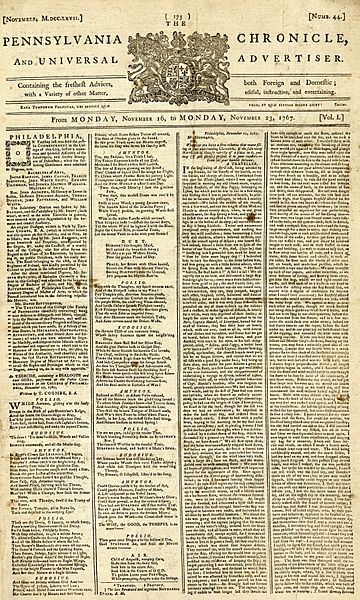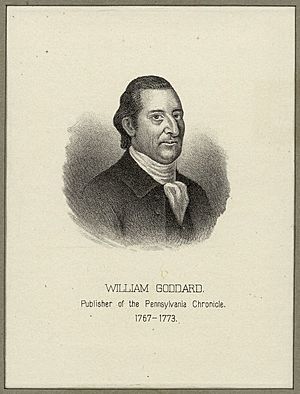Pennsylvania Chronicle facts for kids
The Pennsylvania Chronicle and Universal Advertiser was an important newspaper in America before the American Revolution. It started in 1767 in Philadelphia, Pennsylvania. William Goddard founded it with his partners Joseph Galloway and Thomas Wharton. Even Benjamin Franklin, a famous American, was also a partner with the Chronicle.
This newspaper was created to challenge the power of the Penn family, who governed Pennsylvania. It also spoke out against the British government, which was making laws and taxes for the colonists without letting them have a say in the British Parliament.
The Chronicle came out once a week, every Monday. The first newspaper was printed on January 6, 1767. It was printed using a new type of letters at Goddard's printing company in Philadelphia. A yearly subscription cost ten shillings. The newspaper was published from January 1767 until February 1774.
In 1768, William's sister, Mary Katharine Goddard, joined the business. She later became famous as the first woman postmaster in Maryland. She helped manage her brother's printing office in Philadelphia. By 1770, the Pennsylvania Chronicle was very popular. It printed about 2,500 copies each week. This made it one of the most successful newspapers in the colonies.
Most printing presses in the American colonies came from England. But Isaac Doolittle, a clock-maker from New Haven, built a special printing press for Goddard's Pennsylvania Chronicle. This was the first printing press ever built in the American colonies.
Goddard's newspaper had rivals. Another printer in Philadelphia, William Bradford III, had his own newspaper. He started a "newspaper war" against Goddard. This became very personal. Goddard also faced challenges, including being jailed for debt in 1771. This might have been because of his powerful former partners, Galloway and Wharton.
Contents
The Chronicle and the Revolution
The Pennsylvania Chronicle was a main way for people to share their feelings against the British. These feelings were growing quickly before the American Revolution. The newspaper became very well-known when Goddard printed an article supporting the Boston Tea Party.
The British government was worried about the newspaper's support for the revolution. Soon, the British mail system, called the Crown Post, charged high taxes to deliver the paper. Later, they simply refused to deliver it at all. The Crown Post eventually forced the newspaper to close in 1773. Because of this, Goddard and Benjamin Franklin started a new mail system. This system was separate from the British one. It later became the foundation for what is now the US Post Office.
Important Letters from Dickinson
From 1767 to 1768, the Pennsylvania Chronicle printed a series of 12 essays. These were called Letters from a Farmer in Pennsylvania to the Inhabitants of the British Colonies. They were written by John Dickinson. In these letters, Dickinson explained why the colonists were right to object to British taxes. He said these taxes were unfair because the colonists had no say in the British Parliament. Dickinson strongly encouraged Americans to protest British actions. He suggested using legal requests, then boycotts, and if needed, even fighting.
Speaking Out Against the Stamp Act
On August 1, 1768, the Pennsylvania Chronicle printed a big article on its front page. It was about a speech given at the State House (now Independence Hall). This speech was against the Stamp Act and other unfair tax laws. These laws were passed by Britain without any input from the colonists.
Supporting the Boston Tea Party
In 1773, the newspaper became even more famous. It published an article that told the story of the Boston Tea Party. The article also showed strong popular support for this rebellious and historic event.
The Chronicle Defends Franklin
Benjamin Franklin was in London in 1765, representing Pennsylvania. He was against the Stamp Act. Even though he knew the law would pass, he worked to get it removed. However, some people in Pennsylvania thought Franklin was not being honest. To stop these rumors, William Goddard reprinted many of Franklin's essays from London newspapers in the Pennsylvania Chronicle. These articles showed that Franklin was actually against the Stamp Act.
 | Janet Taylor Pickett |
 | Synthia Saint James |
 | Howardena Pindell |
 | Faith Ringgold |



